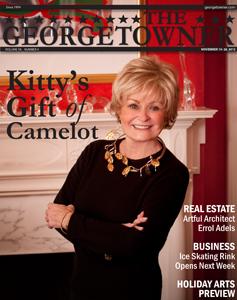Power Women of Georgetown Talk
By • February 18, 2016 0 1113

“The City of Conversation” takes place entirely in the Georgetown living room of Hester Ferris, the kind of set very familiar to Georgetown residents who were part of — or chronicled — the high tides of the village’s fame as a locus of social and political power. Although Georgetown has changed over time, its image nonetheless remains potent.
In the second half of the 20th century, the leading ladies of Georgetown’s social and political scene included Evangeline Bruce, Lorraine Cooper, the Washington Post’s powerful publisher Katharine Graham, Pamela Harriman, who became Ambassador to France, and Sally Quinn, the savvy and stylish author, novelist, Post reporter and wife of legendary editor Ben Bradlee. (Those five were profiled in the 2003 book “The Georgetown Ladies Social Club” — the title a phrase first used by Ronald Reagan — which could serve as a bookend to the recent “The Georgetown Set: Friends and Rivals in Cold War Washington.”)
Female movers and shakers are still in style here, but the political and social scene is not what it was. There is more of an emphasis on fundraising and charitable events, with leaders such as Elizabeth Bagley, Nancy Pelosi, Valerie Jarrett, Kitty Kelley and Quinn.
We talked with Quinn and with another Georgetown resident, biographer Kitty Kelley, about Georgetown’s political and social scene, then and now.
SALLY QUINN, famous for her talked-about profiles in the Washington Post’s Style section, never wrote a play. Her two novels, “Regrets Only” (1986) and “Happy Endings,” both feature a smart, beautiful blonde reporter for a major Washington daily.
Comments about Georgetown then and now from Sally Quinn:
“What I like about the play is that it is not a frivolous play about parties.… The drama is right-on” — about another era, a time and a place that no longer exist.
“So many of these hostesses had dysfunctional families. … They put their energies into being hostesses — today they would be CEOs.”
Of the main character in the play, she said, “Her priorities were completely skewed. In the end, it’s a mistake” not to make your family a priority.
Now, she said, the entertainment has become about panels and seminars with dinner afterward. And there are still the charity balls — “It’s corporate now. A lot of them are digital people — from that world.”
KITTY KELLEY is famous for her biographies, most of which have drawn cries of outrage from their subjects. She is working on a book about living in her beloved Georgetown. (Send her your stories.)
Comments about Georgetown then and now from Kitty Kelley:
“I think Georgetown still shines.… There are other places, such as moneyed Greenwich or Beverly Hills, which have power and prominence. But Georgetown has that and radiates history — now and in the past.”
“These women started as a hostess — like Nancy Reagan — as a woman operating behind the scenes in influencing legislation. In the play, Hester entertains both parties in her home. … Parties at homes do exist — but they’re fundraisers.”
“‘The City of Conversation’ is a period piece, and tells a family story in a Georgetown setting, but also tells more about what has happened to our politics.”
“It’s interesting that the Supreme Court is at the center of our partisan divisions. The struggle over the Robert Bork nomination will be seen as pivotal to the loss of civility between the two parties — add to that the Clarence Thomas hearings.”
Kelley recalled Henry Kissinger’s often-quoted remark: “The hand that mixes the Georgetown martini is time and again the hand that guides the destiny of the Western world.”

